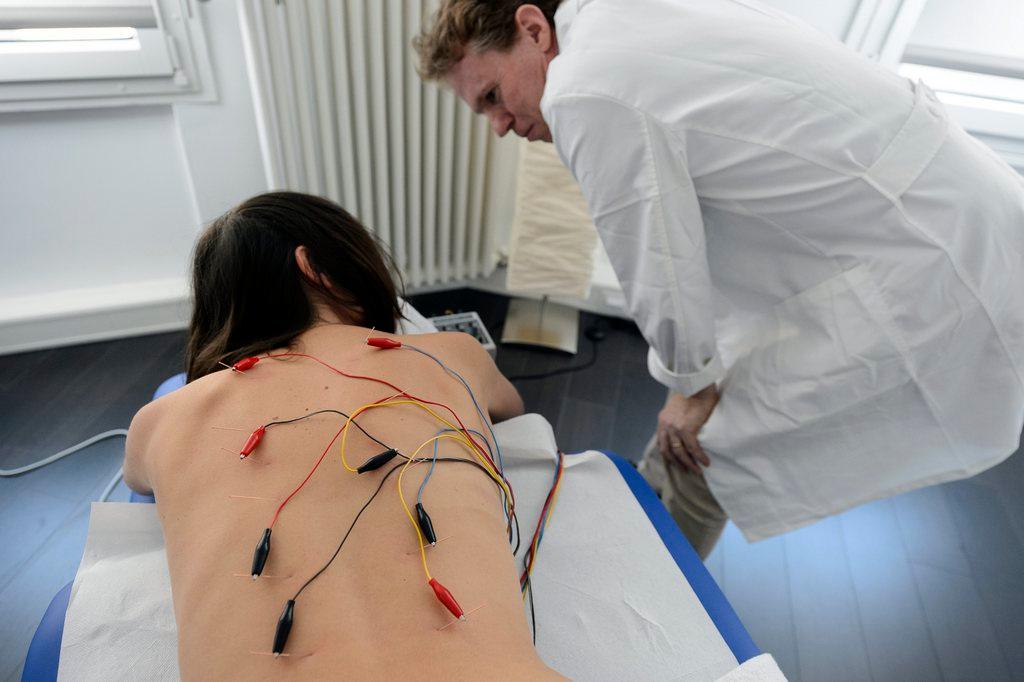Why alternative therapies are covered by health insurance

Switzerland is swimming against the tide with its decision to grant complementary therapies the same status as conventional medicine. Is it a case of the people’s will winning over science?
‘Absurd.’ ‘Unacceptable.’ ‘Startling.’ ‘Squandering taxpayers’ money…’ These were some of the comments on Facebook when swissinfo.ch published the news at the end of March that the government would recognise alternative treatments.
But authoritative Swiss medical organisations don’t agree. At the end of a consultation process involving political parties and experts, the Swiss Society of General Internal Medicine (SGAIM) and the Swiss Medical Association (FMH), along with the major parties, backed the interior ministry’s decision.
In 1999, the interior ministry announced that the cost of several alternative clinical treatment methods (including TCM and homeopathy) would be included in basic health insurance for a six-year trial period.
In 2005, complementary and alternative medicine therapies were struck off the list due to their failure to meet the legal requirement of efficacy.
In response to the complementary and alternative medicine initiative, the government proposed a moderate draft resolution in 2009, which was accepted by a majority of voters.
In 2012, alternative treatments made a comeback and have been covered under basic health insurance for a trial period.
On March 29, 2016, the interior ministry announced plans to give four complementary therapies, including homeopathy and traditional Chinese medicine, the same status as conventional medicine. The new policy is to come into effect by May 2017.
No more than a placebo?
Homeopathy is the most extensively usedExternal link form of complementary and alternative therapies among the Swiss.
According to a report jointly issued by the Federal Health Office and State Secretariat for Economic Affairs (SECO), annual expenses for homeopathic treatments and medications are as high as CHF50 million ($52 million) and CHF31 million, respectively. The numbers are rising.
“The secret of homeopathy is its placebo effect,” says Luojin Lv, a doctor who writes for several Chinese media organisations and is a renowned author of popular science. Lv has worked as a practitioner in China, Japan and the United States. According to him, when people become sick or frail, they are often so desperate they are willing to try anything.
Lv has studied the price-quality ratio of homeopathy. “The medical cost of homeopathy is extremely low. If a child has a fever and requires emergency medical assistance in the US, $600 to $700 is a conservative estimate. But with no more than $20, one can buy a pack of homeopathic pills in the supermarket.”
Homeopathic medicine is almost free of side effects. “The basic component is just water. The only side effect is that it may risk illnesses not being treated properly in time.” One of Lv’s family members turned to complementary and alternative medicine when seriously ill, and that led to the worsening of the patient’s symptoms due to a delay in treatment. “When prescribing medications to patients, doctors should bear in mind that the most important criterion is not its side effects, but its efficacy,” he said.
How to prove efficacy?
Research on the efficacy of homeopathy, including meta-analysis, is ongoing. In a Swiss report released in 2012External link, homeopathy was confirmed as “a valuable addition to the conventional medical landscape”. But this conclusion has been challenged by medical scholars in other countries and the findings have been considered groundless, since they do not include the same randomised controlled clinical trials of evaluation and validation as conventional therapies.
From western medicine’s point of view, large-scale clinical testing is the most recognised form of scientific evidence. The homeopathy studies conducted by the National Health and Medical Research Council (NHMRC) of the Australian GovernmentExternal link in 2013 and 2015 have been deemed the most authoritative.
According to Lv, that’s because the studies included a considerable number of samples and covered a wide range of regions. “Various health conditions, patients and nations were under study,” he added. NHMRC’s conclusion: “People who choose homeopathy may put their health at risk, if they reject or delay treatments for which there is good evidence for safety and effectiveness.”
SantéSuisse, the umbrella organisation of health insurers, argues that standardised methods used to test conventional treatments cannot be applied to homeopathy. “It would be unfair to homeopathy if we borrowed the methodologies from conventional therapeutic options when evaluating its effectiveness. The potential risk is that these systematic and internationally accepted methods of biomedical science go against the underlying principles of homeopathy,” said SantéSuisse spokesman Christophe Kämpf.
Homeopathy worldwide
According to the World Health Organisation (WHO), heavy use of homeopathic treatments is still common today in more than 80 countries.
More than 20 nations recognise alternative medicine. The costs of such therapies are reimbursed as part of health insurance coverage in countries including the United Kingdom, France and Luxembourg. But in countries like Belgium and Austria, homeopathic treatments are excluded from health insurance due to their lack of proven efficacy.
The United States Food and Drug Administration (FDA) allows the sale of homeopathic medications even in the absence of conclusive evidence of their safety and effectiveness. The medications referred to are those that treat “self-limited acute diseases” like sprains, colds, or allergies.
Has democracy defeated science?
The federal health office admitted in its press releaseExternal link at the end of March that “no evidence has so far been found to prove that complementary and alternative therapies are qualified in terms of effectiveness, appropriateness, and costs.”
A health office spokesman, Daniel Dauwalder, explained that the decision “reflected the will of the people” in a 2009 referendum.
“The health insurance system will cover the cost of alternative therapies according to the principle of trust,” Dauwalder explained. He added however that if the standards of effectiveness, suitability and economy are called into question, then SantéSuisse has the right to deny payment.
Implementation
The effectiveness of complementary and alternative medicine is not the core of the issue. Rather, it’s how to implement government policy; how to ensure that the physical conditions of patients will not be compromised by unqualified, self-proclaimed doctors; and how health insurers deal with the potential challenges.
The truth is, alternative treatments will not be unconditionally covered by the basic insurance policies every resident must pay for. Only the costs of treatments administered by certified medical doctors will be considered. Otherwise, the costs incurred can only be reimbursed if the person insured has purchased supplementary health coverage.
Would you turn to homeopathy to treat a major illness before consulting traditional medicine? Share your point of view!
Translated from Chinese by Yi Dong

In compliance with the JTI standards
More: SWI swissinfo.ch certified by the Journalism Trust Initiative












You can find an overview of ongoing debates with our journalists here . Please join us!
If you want to start a conversation about a topic raised in this article or want to report factual errors, email us at english@swissinfo.ch.